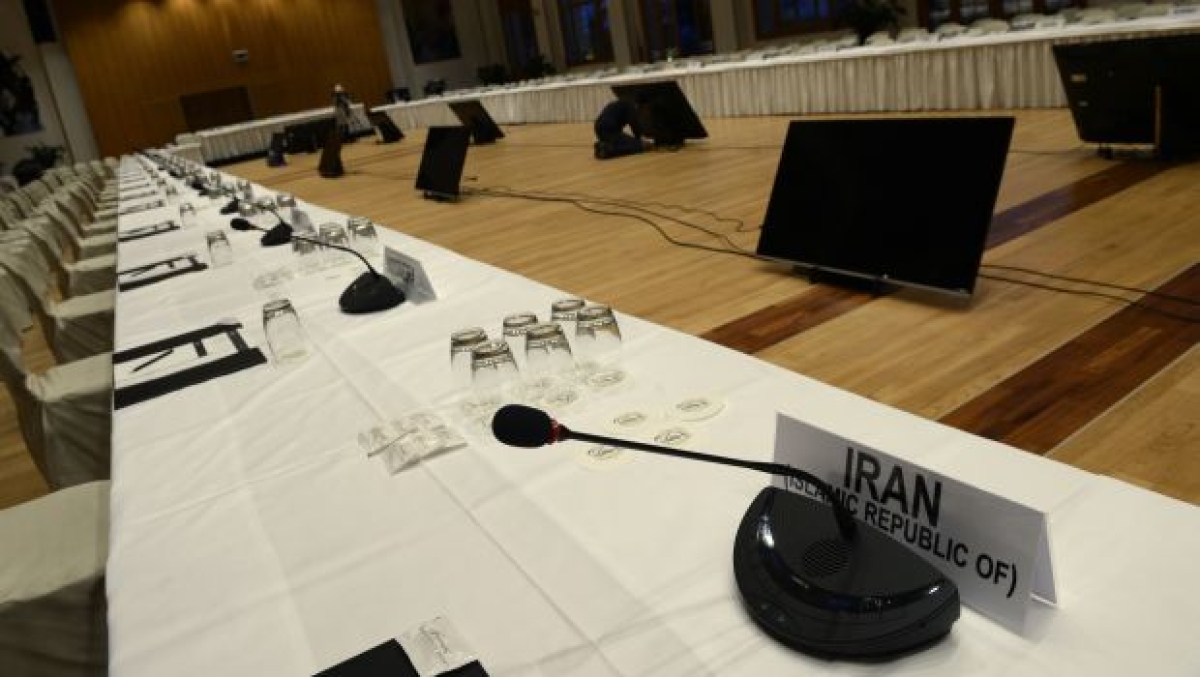 A picture taken on January 20, 2014 in Montreux shows the place of the Iranian representative in the Syria peace conference (PHILIPPE DESMAZES/AFP/Getty Images)[/caption]As many observers and commentators convene on the snow-covered cityscape of Geneva for the inaugural talks between the Syrian National Coalition and representatives of President Bashar Al-Assad’s government, Assad and his allies are already looking beyond Geneva II. Tehran, whose invitation to the talks was rescinded, will avoid using its influence from the sidelines to reach an agreement in Geneva this week. US President Barack Obama, seeking to sustain the deal with Iran on its nuclear program, will not risk linking progress in Geneva with the nuclear agreement.
A picture taken on January 20, 2014 in Montreux shows the place of the Iranian representative in the Syria peace conference (PHILIPPE DESMAZES/AFP/Getty Images)[/caption]As many observers and commentators convene on the snow-covered cityscape of Geneva for the inaugural talks between the Syrian National Coalition and representatives of President Bashar Al-Assad’s government, Assad and his allies are already looking beyond Geneva II. Tehran, whose invitation to the talks was rescinded, will avoid using its influence from the sidelines to reach an agreement in Geneva this week. US President Barack Obama, seeking to sustain the deal with Iran on its nuclear program, will not risk linking progress in Geneva with the nuclear agreement.
The absence of Iran at the talks in Geneva allows Assad to continue to try to define Syria’s political transition on his own terms. In countless interviews with people close to or previously associated with Assad and his inner circle, the only substantial external power that emerges as a factor in Assad’s power calculations is Iran. Believing that he is winning the conflict, Assad will avoid making concessions that diminish his power within the Syrian state. Change is unlikely without Iran having a stake in the process and its outcomes, as Moscow alone cannot move Assad to make serious concessions.
Assad is also keenly aware that Obama is largely ambivalent about the outcome of Syria’s conflict. The White House has repeatedly indicated that the US will not take military action against Assad, and has failed to provide adequate support and resources to the moderate opposition. In doing so, Washington has given Assad a degree of international cover for his military campaign and has allowed the moderate opposition to remain quarrelsome and divided.
The chaotic state of the Syrian opposition also plays in Assad’s favor. The Coalition, in its current state, neither represents nor has the support of the majority of the Syrian opposition. It’s hard to see how it can legitimately negotiate and make concessions on behalf of Syria’s rebels. By failing to broaden the representation of the opposition at Geneva II talks this week, it has allowed Assad’s representatives to avoid making any substantial concessions on the grounds that the Coalition’s delegation is not a credible negotiating partner and cannot make commitments on behalf of the armed opposition.
For the Syrian president, then, the negotiating process is largely a waiting game as he consolidates his military position further. Without credible opposition representation and participation by Iran, Assad is unlikely to approach these talks seriously.
Geneva II’s outcome, then, is largely predetermined. At the very least, a diplomatic communique will likely emerge with a commitment to future negotiations. An agreement could also be reached on expanding humanitarian access in Syria. Less likely, the Assad regime could offer a symbolic concession to the Coalition by inviting it to join the current government if it renounces the armed opposition. For these talks to make any substantial progress in the future, the United States and the UN will need to seriously engage all participants in Syria’s conflict.
All views expressed in this blog post are those of the author and do not necessarily represent the views of, and should not be attributed to, The Majalla magazine.









